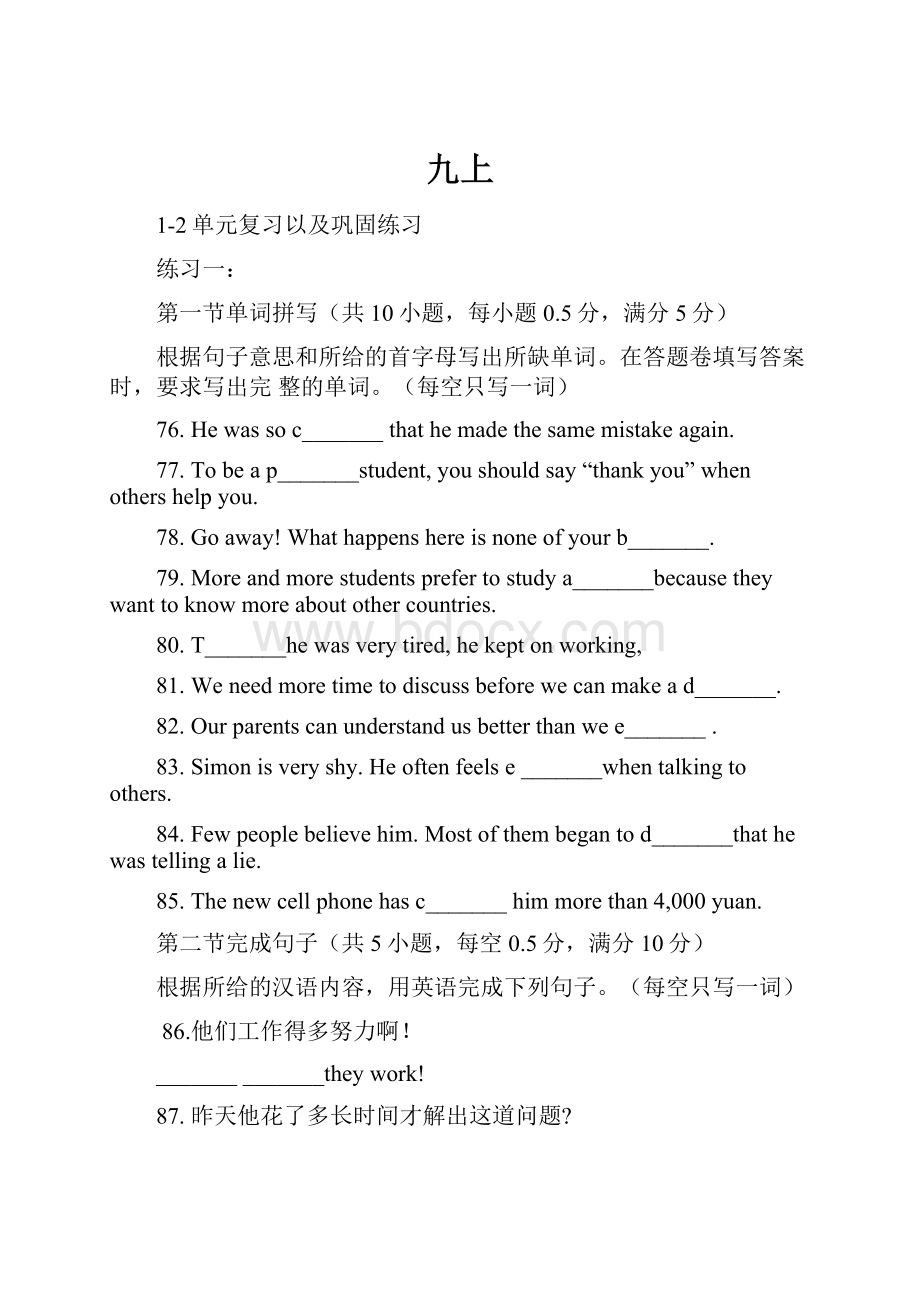九上.docx
《九上.docx》由会员分享,可在线阅读,更多相关《九上.docx(24页珍藏版)》请在冰豆网上搜索。

九上
1-2单元复习以及巩固练习
练习一:
第一节单词拼写(共10小题,每小题0.5分,满分5分)
根据句子意思和所给的首字母写出所缺单词。
在答题卷填写答案时,要求写出完整的单词。
(每空只写一词)
76.Hewassoc_______thathemadethesamemistakeagain.
77.Tobeap_______student,youshouldsay“thankyou”whenothershelpyou.
78.Goaway!
Whathappenshereisnoneofyourb_______.
79.Moreandmorestudentsprefertostudya_______becausetheywanttoknowmoreaboutothercountries.
80.T_______hewasverytired,hekeptonworking,
81.Weneedmoretimetodiscussbeforewecanmakead_______.
82.Ourparentscanunderstandusbetterthanwee_______.
83.Simonisveryshy.Heoftenfeelse_______whentalkingtoothers.
84.Fewpeoplebelievehim.Mostofthembegantod_______thathewastellingalie.
85.Thenewcellphonehasc_______himmorethan4,000yuan.
第二节完成句子(共5小题,每空0.5分,满分10分)
根据所给的汉语内容,用英语完成下列句子。
(每空只写一词)
86.他们工作得多努力啊!
______________theywork!
87.昨天他花了多长时间才解出这道问题?
Howlong_______it_____him______________thisproblemyesterday?
88.能收到你的来信真是一件荣幸的事。
_______a_______to______________you.
89.他对自己所做的感到很羞愧,一直低着头。
He_____________________whathedidandkepthisheaddown.
90.她经常被她弟弟的行为气疯。
She_______often______________byheryoungerbrother’sbehaviour.
91.很多人都对这个无聊的电视节目没有兴趣。
Manypeople_____no______________this_______TVprogramme.
练习二:
第1节单词拼写(共10小题,每小题0.5分,共5分)
66.HeisanhonestmanbutId______thathetoldthetruththistime.
67.Ifyoucan’ts______theproblem,pleaseletmeknow.
68.Heispopularbecauseheisamanwithas_______ofhumor.
69.Thebusissocrowed.Couldyoupleaseo______yourseattotheoldlady?
70.Shehast______workingoutthisproblem.
71.Beingstudents,everyoneshouldo______therulesinourschool.
72.Myfriends________meseeingamovieafterschool,butIthoughtitwasawasteoftime.
73.Thegirllookssop______andweakbecauseofsomeillness.
74.Ididn’treceivehisi______.SoIdidn’tattendhiswedding.
75.Shewassotiredthatshep________outsuddenlyatwork.
第2节完成句子(共10小题,每小题1分,共10分)
76.我大概是把书忘在家里了。
I__________haveleftmybookathome.
77.明天我要去伦敦了。
请确保一切准备妥当。
WearegoingtoLondontomorrow.Please__________everythingisready.
78.你应该避免谈论他离婚的事情。
Youshould___________________hisdivorce.
79.这个男孩没有让他的父母失望。
Theboydidn’t_____hisparents_______.
80.他厌倦了学习。
他没有完成家庭作业。
He__________ ______study.Hedidn’tfinishhishomework.
81.我父母期望我尽最大努力学习。
Myparents___________________studyashardasIcan.
82.你应该为自己说这样的谎话感到羞愧。
Youshould_______________yourselffortellingsuchlies.
83.你帮助我真是太好了。
It___________________youtohelpme.
84.他是那么严肃,以至人人都不愿意和他合作。
Heis____serious_____nobodywouldliketoco-operatewithhim.
85.很难让这个调皮的男孩保持不动。
It’sdifficulttomakethenaughtyboy____________.
练习三:
22.她环顾四周以确定没有其他人
Shelookedaroundto_______________therewasnobodythere.
23.不要捉弄他,他是个可怜的孩子。
Don’t___________________________him.Heisapoorboy.
24.真正好的音乐永远不会过时。
Reallygoodmusicwillnever__________________ ____.
25.我不能吃太多东西,因为我正在节食。
Ican’teattoomuchbecauseI________________________
26.在工作日他们常常看新闻。
Theyoftenwatchnews__________________.
反义疑问句
考点分析
【1】反意疑问句的基本形式:
由一个陈述句加简短问句构成
Heisateacher,isn’the?
【2】前面肯定,后面否定;前面否定,后面肯定
Icanswim,can'tI?
Ican'tswim,canI?
【3】前面主语不管是什么,后面的主语一定是代词(there除外)
Theboyisyourbrother,isn’the?
Petersingswell,doesn'the?
Thereissomewaterinthebottle,isn'tthere?
【4】前面有表否定的词,后面加肯定
常见的词有:
no,not,nothing,few,little,never,hardly,seldom等
Thereislittlewaterinthebottle,isthere?
【5】祈使句
否定的祈使句:
用willyou?
Don'tmakenoise,willyou?
肯定的祈使句:
用willyou或won'tyou?
Writedownthenewwords,willyou/won’tyou?
*特殊:
Let’s…,+shallwe?
Letus…,+willyou?
【6】前面是Iam,后面用aren’tI前面是Iamnot,后面用amI.
Iamsad,aren’tI?
Iamnotsad,amI?
【7】指示代词
1.前面用this,that,则后面用it
Thisisyourbrother,isn’tit?
2.前面用these,those,做主语,则后面用they
Theseareapplesforme,aren’tthey?
【8】不定代词
1.指物的不定代词:
nothing,something,anything,everything做主语,则后面用it
Somethingiswrongwithit,isn’tit?
2.指人的不定代词everybody/everyone,somebody/someone,
anybody/anyone做主语,则后面用he或they
Everyoneknowsthis,don’tthey?
Everyoneknowsthis,doesn’the?
巩固练习:
30.Tomtellsyouaboutit,_____________?
31.Iamfoolishtodoso,________________?
32.Bill’scaughtupwithhisclassmates,_________________?
33.HecanhardlyspeakEnglish,____________________?
34.Idon’tthinkheisright,___________________?
35.Ibelievethathewillcome,____________________?
36.Mymotherdoesn’tbelievethathewillcome,__________?
37.Thereislittlemilkinthebottle,___________________?
38.Therearefewpeopleintheroom,____________?
39.Wedon’tbelievehewillcome,____________?
40.Let’sgotothecinema,__________?
41.Theyaren’tstudents,__________?
动词不定式
1.动词不定式的用法
1)作主语:
动词不定式作主语时往往放在谓语动词的后面,并用it作形式主语。
例:
Totalkwithhimisagreatpleasure.
=Itisagreatpleasuretotalkwithhim.
(1)可以用forsbtodosth.来说明不定式表示的动作执行者,即不定式的逻辑主语;某些形容词,如:
kind,good,nice,wrong,right,polite,clever,wise,foolish,etc.作表语时逻辑主语常用of引起的短语。
例:
1tisveryimportantforstudentstostudyhard.
Itisunwiseofhimtostartsmoking.
=Heisunwisetostartsmoking.
(2)常用不定式作主语的句型有:
It'sdifficult(important,necessary,easy,unnecessary,etc.)forsbtodosth.
It'skind(good,friendly,polite,careless,rude,cruel,clever,foolish,brave,etc.)ofsbtodosth.
2)作表语:
不定式做表语常表示在谓语动词所表示的动作之后发生的动作。
例:
Hiswishistobecomeaskillfulworker.
注意:
主语部分已有动作动词do(不论形式),作表语的不定式前省略to。
例:
TheonlythingIcandonowisgoonwiththeexperimentallbymyself.
3)作宾语:
常见的直接带to不定式的动词有like,agree,decide,hope,learn,wish,etc.
例:
Mostofusliketowatchfootballmatches.
(1)常见的能跟疑问词带to连用的不定式的动词有decide,findout,show,etc.
例:
Ishowedthemhowtodoit.
(2)不定式自带补语时it先行
例:
Wethoughtitwrongnottotellherthetruth.
(3)不定式不做介词后面的宾语,但介词except,but,besides除外,注意在这些介词前若有表示动作的动词do(不论形式),作宾语的不定式前省略to。
倒:
Shecoulddonothingbutcry.
Ihavenochoicebuttogothere.
洼意:
有些动词,如hope,wish,agree,pretend,refuse,manage,beg,intend;hesitate,offer,fail,expect,decide,prepare,promise等后面只能用动词不定式作宾语。
4)作宾语补足语:
句子中的宾语是不定式的逻辑主语。
例:
Hetoldmetobehereontime.
在动词make,let,have,see,hear,lookat,listento,observe,feel,notice,watch,etc.后,作宾语补足语的不定式要省略“to”,但在被动语态中作主语补足语时必须还原“to"。
例:
Thebossmadethemworktwelvehoursaday.
IheardBillsinganAmericanfolksongtheotherday.
Isawhercomein.
=Shewasseentocomein
注意:
有些动词,如hope,suggest,demand,suppose,plan,agree等不能用动词不定式作宾语补足语。
5)作定语:
不定式作定语放在所修饰的名词后,表示在谓语动词之后发生的动作或过去的某一特定动作。
例:
Shehasgotalotofquestionstoask.
(1)作定语的不定式与修饰的名词可以是逻辑意义上的主谓关系。
例:
Heisthefirstpersontorunamarathoninlessthantwohours.
(2)作定语的不定式与修饰的名词也可以是逻辑意义上的动宾关系。
例:
Hehasnohousetoliveinbutalotofworktodo.
(3)如果不定式的动词为不及物动词,应在动词后面加上适当的介词。
例:
Heisanicepersontoworkwith.
6)作状语:
不定式可用作目的状语、结果状语和原因状语。
例:
Istartedearlysoastogettherebeforesupper.
Iopenedthedoortofindtheroomempty.
I’msorrytohearyouarenotwell.
注意:
soasto,inorderto都是表示目的的不定式短语,soasto不能放在句首,他们的否定式为soasnotto/inordernotto。
不定式作结果状语常用于“too+adj./adv.+todo”或“adj./adv.+enough+todo”结构。
例:
Heisstrongenoughtoliftthecase.
2.动词不定式的否定形式
Not+to+动词原形构成;有时也可以用nevertodo表示否定意义,语气更强。
例:
Weagreednottolendhimanymoney.
Hepromisednevertotellheranythingaboutthis.
3.动词不定式与疑问词连用
疑问代词who,what,which和疑问副词when,where,how,why等后面可以接动词不定式,构成动词不定式短语,可以在句子中作主语、宾语、表语成分。
例:
Howtousethemachineisaquestion.(不定式作主语)
Hedoesn’tknowhowtousethemachine.(不定式作宾语)
Thequestioniswhentoholdthetrainingclass.(不定式作表语)
Shetoldmewheretofindherlittlebrother.(不定式作宾语补足语)
4.too…to结构常表示否定意义
例:
It’stoocoldtogoswimmingtoday.今天天气太冷,不能去游泳。
注意:
在以下几种情况下,too…to结构意思是表示肯定,常译作“非常”。
1)too…to与only连用(这时onlytoo=very)
例:
I’monlytoogladtohelpyou.我非常高兴帮助你。
2)形容词willing,pleased,glad,happy,ready,anxious等。
例:
Thestudentsaretooanxioustoknowtheexaminationresults.
学生们非常急切地想知道考试成绩。
3)与not,never连用,表示“太……不能不”,“并不太……所以能”。
例:
Sheistoowisenottoseethat.她很聪明,不会不明白那件事。
It'snevertoolatetomend.亡羊补牢,为时未晚。
5.动词不定式有五种不同的主动和被动形式
1)一般式todo,表示的动作可能与谓语的动作同时发生,也可能在其之后发生。
例:
IliketoreadEnglisheverymorning.
2)进行式tobedoing,表示不定式的动作已在进行,与谓语动词同时发生。
例:
Heseemstobereadingsomethinginterestingnow.
3)完成式tohavedone,表示不定式的动作在谓语动词之前发生。
例:
Heseemedtohavecleanedhisbedroomyesterday.
4)被动式tobedone,表示该事情将要被做。
例:
Thenewschoolinthecountryistobebuiltsoon.
5)被动完成式tohavebeendone,表示该事情已被做。
例:
Thesickboyissaidtohavebeensenttohospitalalready.
6.动词不定式的主动形式表示被动意义的几种情况
1)在too…to和enough…to结构中,不定式的主动形式可以表示被动意义。
例:
The.skirtistoosmallformetowear.
Theroomisbigenoughtolivein.
2)在therebe句型中,可以用不定式的主动形式表示被动意义。
例:
Thereisalotofworktodo.
=Thereisalotofworktobedone.
3)easy,difficult,hard,cheap,expensive,fit,nice,pleasant,comfortable,exciting
dangerous,bitter,light,heavy,good,interesting等描述事物特征的形容词,后面接动词不定式作状语时,常用主动形式表示被动意义,主语常常是物。
例:
Thepictureispleasanttolookat.
4)动词不定式作定话时,若其逻辑主语是句子的主语或宾语时,则可以用主动形式表示被动意义。
例:
Ihavealotofworktodo.(I是todo的逻辑主语)
Givemesomethingtoeat.(me是toeat的逻辑主语)
巩固练习:
1、单项选择
16.-Thenewstudentappearsquiteoutofplaceinourclass.
-Ithinkhedoesn’tgetusedtothenewlifehere.Weshouldgivehim_hand.
Athe;aB./;theC.a;theD./;a
17.-WhoseT-shirtisthis?
-ItbeJohn's.Itsmallforhim.
A.mustn’t;toomuchB.mustn’t;muchtoo
C.can’t;toomuchD.can’t;muchtoo
18.-Haveyoufoundhereintheroom?
-EverythingisOKthebrokenwindow.
A.specialanything;exceptB.anythingspecial;besides
C.specialanyth